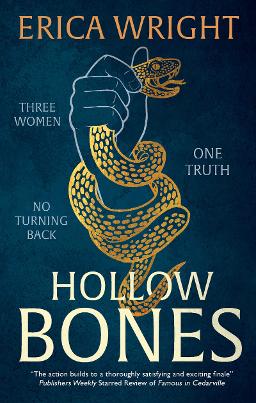Book Review
Opening the gorgeous cover of Hollow Bones, the reader is drawn immediately into Erica Wright's rural, West Virginian reimagining of Measure for Measure. As in Shakespeare's play there's a new "sheriff" in town, in this case Micah, a snake-wielding pastor who revives New Hope Pentecostal Church, and presents himself as a hero rooting out the scourge of addiction. Wright's choice of setting acknowledges the state's reputation as the most hard-hit by opioid addiction, but the depictions of the community or its people never veers into caricature. While Hollow Bones offers a contemporary spin on Shakespeare's tale of innocence pitted against power, familiarity with Measure for Measure isn't necessary to understand or appreciate Wright's novel.
The story begins with a devastating fire which has destroyed New Hope Church but spared the rectory, home of the late preacher’s daughter. Essa is a twenty-year-old living a cloistered life in the shadow of her parents, victims of snakebite within the church. After a long day working at a wildlife investigation lab, she's approached by the police, confronted with news of the fire and the discovery of two bodies in the ruined church. The cops whisk her off by cruiser, insisting that she help coerce a confession from her brother Clyde, who is charged with the murders. Essa is at once relieved the site of her parents' death is no more, and afraid for her brother’s fate and the possible loss of her home.
Wright's specificity creates a vivid portrayal of the fictional town of Vintera; her use of setting goes beyond description, furthering the reader's understanding of character. As tension builds within Hollow Bones, Essa's view of her environment transforms from a protector to ominous stranger:
The landscape matched her mood as it whipped by her window, icy and desolate. Essa liked seeing themountains in the distance, a bit like sentinels guarding their town, but once you found yourself in them,they became menacing.
An alternating point of view gives voice to three female protagonists, as well as Micah, a scheming antagonist: Essa, raised to be submissive, struggling to emerge as more than a 'serpent orphan;’ Juliet, a practicing medium, engaged to Clyde and pregnant with his child, fighting to keep her family intact; Merritt, a ruthless journalist striving for the top; and Micah, an opportunist and self-proclaimed prophet, exploiting weakness to build his following and seduce Essa.
In another novel, shifting points of view can feel distracting; here, each section coils tightly around the story's central questions. Who bears responsibility for the fire and subsequent deaths? Will Essa surrender to other people's desires, or fight to maintain boundaries and create a life for herself?
The major players are isolated in their own way, distrustful of one another, and seek easy answers to their problems. Essa plans to escape the past and the confines of her small town, the same way Meritt pursues a larger spotlight, while Clyde and Juliet pressure Essa to surrender her body to the pastor in a desperate effort to escape his conviction. Micah’s tagline, "How's your faith?" conveys a message to members of New Hope’s congregation that belief in him and the church is all that's needed to escape their worldly sins.
In another novel, shifting points of view can feel distracting; here, each section coils tightly around the story's central questions. Who bears responsibility for the fire and subsequent deaths? Will Essa surrender to other people's desires, or fight to maintain boundaries and create a life for herself?
Essa, whose name may come from Esther, meaning “star,” is the novel's center, an innocent placed in an untenable position by people who should be sources of comfort but instead want something from her. When she yields to her brother and Juliet, pleading with Micah to intervene in her brother's case, he makes clear his price: “Pastor Micah swirled back toward her…graceful as a serpent. ‘Oh I will, I can. I only need one favor in return. Do you know what
that is?’”
In the epigraph, Wright nods to the story's title: “…thy bones are hollow, impiety has made a feast of thee.” The quote from Measure for Measure alludes to themes of power's tendency to corrupt, yet the reference to hollow bones, air sacs which provide birds with extra oxygen and strength for flight, becomes a metaphoric comparison to Essa's character. Though physically insubstantial, as delicate as a bird, she demonstrates the strength of character to fly above the fray: “When you're left on your own at eighteen, you make your own code of conduct. She'd never written it down or anything, but she stuck by certain principles. They kept her afloat.”
New takes on classic stories inevitably lead the reader to wonder why the author chose this story, at this moment in time. In the acknowledgments, Wright shares her long-running fascination with Measure for Measure’s Isabella and her plight. In the article she penned for Guernica in 2011, "Sex, Lies and Iambic Pentameter," Wright describes her disappointment after watching a recent production and discovering other audience members dismissing Isabella's predicament: “The events in Measure for Measure prove we have not come far enough when a man’s word still counts for more than a woman’s and when an elected official can play by a different set of rules than the rest of us.”
Unfortunately, the inequities explored in Hollow Bones are as relevant in 2024 as in Shakespeare's times; current news brims with stories of women who are not to be believed, at least not until the video surfaces. History repeats itself with current political leaders who seek fame on the national stage with a promise that complex issues can be solved easily if followers pledge their unfailing loyalty.
Though this novel bears many traits of literary fiction, at its core it is a mystery, and the story possesses all the elements mystery readers come to expect—a deadly crime, an array of characters with questionable motivations, and a satisfying conclusion. Wright plays fairly with the reader while the story unfolds in its own way. Hollow Bones is a novel about responsibility; the responsibility we have to ourselves, to others, and to the natural world.

Mary Sophie Filicetti is a teacher whose fiction has appeared in The MacGuffin, Every Day Fiction, Nightingale and Sparrow, The Magnolia Review, 365 Tomorrows and The Phoenix. She holds an MFA from Spalding University and is a first fiction reader at Little Patuxent Review.
_____________________________________________
Home Archives Fiction Poetry Creative Nonfiction Interview
Featured Artist Reviews Multimedia Masthead Submit
_____________________________________________

